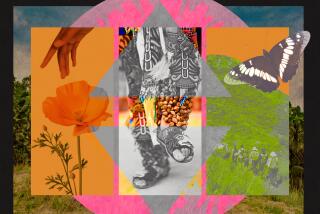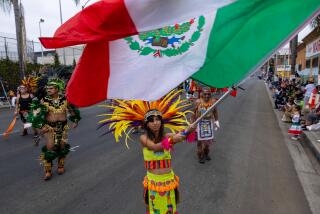Indigenous Peoples Day or Diversity Day? L.A. is poised to rename Columbus Day, but councilmen have different ideas
Los Angeles City Councilman Joe Buscaino has long been effusive about his Italian heritage, bringing opera singers to City Hall and posting YouTube videos about his family’s tomato sauce and his parents’ move from Sicily.
Councilman Mitch O’Farrell, a member of the Wyandotte Nation, is equally passionate about his Native American roots. When he took office four years ago, he was sworn in by his tribe’s chief, who performed a traditional blessing at the event.
Now the two councilmen, one from a neighborhood next to the port, the other representing the increasingly affluent Echo Park-to-Hollywood area, are at odds over an incendiary issue: Columbus Day.
O’Farrell wants the council to rename the holiday, at least on the city calendar, as Indigenous Peoples Day, arguing that Columbus’ arrival in 1492 resulted in centuries of anguish for the continent’s native population. Buscaino, on the other hand, has been pushing for a different name change — last week, he floated Diversity Day — to prevent Italian Americans who have long celebrated Columbus Day from feeling excluded or replaced.
Whether a last-minute compromise can be reached is unclear. O’Farrell’s proposal comes to up for a vote Wednesday. The issue has become “very emotional,” said Council President Herb Wesson, who frequently brokers disagreements between city lawmakers.
“This is one of those issues where I think all [council] members will search their souls. Every one,” Wesson said. “I would anticipate that this vote will be a total gut-and-heart vote.”
The two men at the center of the Columbus Day debate come from different worlds. Buscaino, a former officer with the Los Angeles Police Department, grew up in a working-class Italian family in San Pedro. His dad was a commercial fisherman, while his mother skinned fish at a cannery on Terminal Island, according to a video on Buscaino’s Italian heritage.
Since winning election in 2012, Buscaino has used his office to promote the culture and accomplishments of Italy and Italian Americans. He drummed up tens of thousands of dollars from the city budget to support Italian American Heritage Month. Last summer, he took his family — and three council colleagues — on a business and cultural exchange trip to Italy.
Tom Gilmore, chairman of the nonprofit group Sister Cities of Los Angeles, went along and met Buscaino’s relatives on that trip, which had stops in Rome, Palermo and the island of Ischia. In each location, Buscaino was “greeted as a brother,” he said.
“His love of Italy, and his familial attachment to it, is deep and broad,” said Gilmore, who is also a partner with the real estate company Gilmore Associates. “I’ve seen it up close and personal. It is real for him.”
O’Farrell, for his part, grew up in a suburb of Oklahoma City, in a section of the state referred to as Tornado Alley. His grandfather twice served as chief of the Wyandotte tribe in Oklahoma. His mother, who worked at one point as a researcher for the Citizen Potawatomi Nation, told stories about performing in powwows and warned there was a darker story behind Columbus Day.
A former actor, singer and dancer, O’Farrell spent the early part of his adult life appearing in stage plays, performing on cruise ships and doing walk-ons for television soap operas. He later worked in restaurants and in 2002, became an aide to then-Councilman Eric Garcetti.
After taking office, O’Farrell has identified funding for Native American Heritage Month and spoken out against the Dakota Access Pipeline project, saying it would harm the ancestral lands of the Standing Rock Sioux Tribe.
O’Farrell compared his proposal to the ongoing campaign to remove statues of Confederate military figures from the Civil War. Once in the Caribbean, Columbus and his men transported hundreds of Taino Indians back to Spain as slaves, O’Farrell said.
“The atrocities that they were responsible for are nothing to be celebrated,” he said.
Supporters of Columbus Day, established as a national holiday in 1937, say the explorer should not be held responsible for the smallpox epidemic and the subjugation of the indigenous people. But Native American activists are praising O’Farrell for standing firm.
Emiliano Martinez, a sound engineer who lives in O’Farrell’s district, described Columbus as a symbol of genocide. “He’s the same as Hitler to us,” said Martinez, who is Native American.
O’Farrell’s plan would require the city to celebrate Indigenous Peoples Day on the second Monday in October, the same day as the federal Columbus Day holiday, which serves as a day off for city employees. As part of the proposal, the city would celebrate a separate Italian American Heritage Day on Oct. 12, the day of Columbus’ arrival.
Buscaino has criticized that idea, arguing in the L’Italo-Americano newsletter last year that council members should not “replace one culture for another.” Two months ago, Buscaino unveiled a plan for renaming Columbus Day locally as Immigrant Heritage Day — a move that would have pushed Indigenous Peoples Day to August or September.
That plan drew support from Council Members David Ryu, Gil Cedillo and Mitchell Englander, all of whom joined Buscaino in Italy last year. But Native Americans responded angrily, calling such a move disrespectful to them.
A committee headed by Wesson endorsed O’Farrell’s proposal in June. Buscaino said at the time that the vote made him “embarrassed” to be a council member — and compared it to taking Martin Luther King Jr. Day off the city’s books.
In recent days, Buscaino has discussed the idea of having Columbus Day renamed locally as Diversity Day.
“We want a day that’s going to embrace Los Angeles, not divide Los Angeles,” he told The Times last week.
We want a day that’s going to embrace Los Angeles, not divide Los Angeles.
Historian Marianna Gatto, director of the Italian American Museum of Los Angeles, said her group has not weighed in on what should happen to Columbus Day. But she noted that the Italian American community is divided on the issue.
Italian Americans, she said, did not initially propose the idea of Columbus Day in the United States. By the 1920s, as they experienced hardship and bias, they came to embrace the idea as a way to demonstrate pride in their heritage, Gatto said.
“They were looked down upon like immigrants are looked down upon today,” she said.
None of the proposals floated by either Buscaino or O’Farrell have been welcomed by Patrick Korten, a board member with the National Christopher Columbus Assn., which seeks to protect the Columbus Day holiday in Los Angeles and elsewhere.
Columbus’ arrival, said Korten, deserves to be acknowledged as “arguably the most important event in the history of world humanity.”
“At that moment, tens of millions of people in different parts of the world, completely unaware of each other, found out there was much more to the world than they ever imagined,” he said. “It’s not just about Christopher Columbus.”
Twitter: @DavidZahniser
ALSO
Immigrants rescued from forced labor ring, prosecutors say
Dole, the world’s largest fresh fruit and vegetable company, is stepping back from Southland
More to Read
Sign up for Essential California
The most important California stories and recommendations in your inbox every morning.
You may occasionally receive promotional content from the Los Angeles Times.










